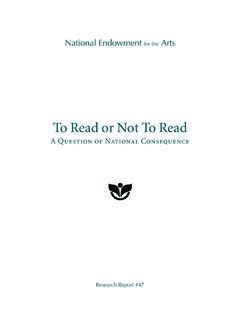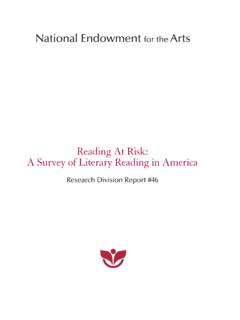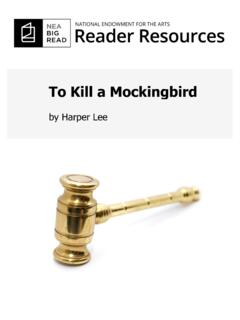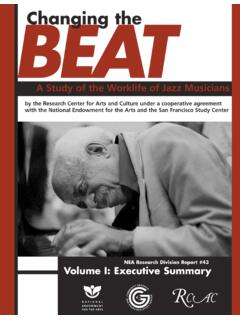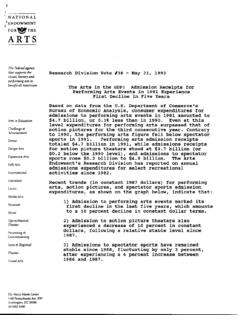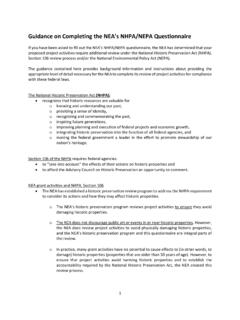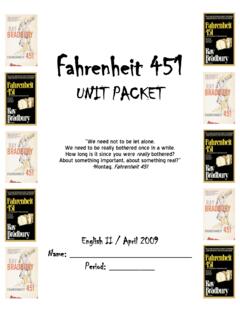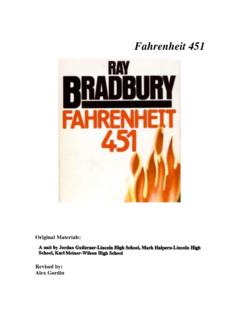Transcription of by Ray Bradbury - NEA
1 1 fahrenheit 451 by Ray Bradbury NEA Big Read The National Endowment for the Arts 2 About the 3 About the Author .. 4 Historical and Literary Context .. 6 Other Works/Adaptations .. 8 Discussion 10 Additional Resources .. 11 Credits .. 12 Preface When did science fiction first cross over from genre writing to the mainstream of American literature? Almost certainly it happened on October 19, 1953, when a young Californian named Ray Bradbury published a novel with the odd title of fahrenheit 451. In a gripping story at once disturbing and poetic, Bradbury takes the materials of pulp fiction and transforms them into a visionary parable of a society gone awry, in which firemen burn books and the state suppresses learning. Meanwhile, the citizenry sits by in a drug-induced and media-saturated indifference. More relevant than ever a half-century later, fahrenheit 451 has achieved the rare distinction of being both a literary classic and a perennial bestseller.
2 What is the NEA Big Read? A program of the National Endowment for the Arts, NEA Big Read broadens our understanding of our world, our communities, and ourselves through the joy of sharing a good book. Managed by Arts Midwest, this initiative offers grants to support innovative community reading programs designed around a single book. A great book combines enrichment with enchantment. It awakens our imagination and enlarges our humanity. It can offer harrowing insights that somehow console and comfort us. Whether you re a regular reader already or making up for lost time, thank you for joining the NEA Big Read. Table of Contents fahrenheit 451 You don t have to burn books to destroy a culture. Just get people to stop reading them. NEA Big Read The National Endowment for the Arts 3 Introduction to the Book The three main sections of Ray Bradbury 's fahrenheit 451 all end in fire.
3 The novel focuses on Guy Montag, a fireman. In the first section, we discover that Montag is a professional book burner, expected to start fires instead of putting them out. For years he has done his job obediently and well. Then one day, he is called upon to burn the books of a Mrs. Hudson, who prefers to die rather than leave her library. Furtively, Montag pockets some of her books, haunted by the idea that a life without books might not be worth living after all. As Montag begins to read deeply for the first time in his life, fahrenheit 451's second section traces his growing dissatisfaction with the society he is paid to defend. He seeks out the counsel of an old man named Faber, whom he once let off easy on a reading charge. Together they agree to copy a salvaged Bible, in case anything should happen to the original. Montag's boss at the firehouse, Beatty, senses his disenchantment and interrogates him until their confrontation is interrupted by a fire call.
4 Responding to the address, Montag is expected to start a conflagration considerably closer to home. fahrenheit 451's final section finds Montag seizing his own fate for the first time. He avenges himself on Beatty and strikes out for the countryside. There he finds a resistance force of readers, each one responsible for memorizing and thereby preserving the entire contents of a different book. As they bide their time in hope of a better future, a flash appears on the horizon: While society was staring at full-wall television screens and medicating itself into a coma, the largest fire yet has broken out. The book's three holocausts expand concentrically. The death of a stranger by fire in the first third becomes the destruction of Montag's own house in the second. The implication is that, had Montag paid greater attention to his neighbor's plight, he might not have found himself in the same predicament soon afterward.
5 Trouble down the street leads to trouble at home, and trouble at home to trouble abroad. For a book once pigeonholed as science fiction, this structural savvy is one more proof that Bradbury started out writing for the pulps and wound up writing for the ages. Literary Allusions in fahrenheit 451 Walden by Henry David Thoreau A precursor to Granger's philosophy in fahrenheit 451, Thoreau's classic account of the time he spent in a cabin on Walden Pond has inspired generations of iconoclasts to spurn society and take to the wilderness. Gulliver's Travels by Jonathan Swift Swift's satirical 1726 novel follows the journey of Lemuel Gulliver to a series of fanciful islands, none more improbable than the England he left behind. The Bradburian idea of using a distant world as a mirror to reflect the flaws of one's own society doesn't originate here, but this is one early expression of it.
6 "Dover Beach" by Matthew Arnold Arnold's enduring poem about a seascape where "ignorant armies clash by night" has also lent lines to Ian McEwan's novel Saturday, and provided the title for Norman Mailer's Armies of the Night. The Republic by Plato The deathless allegory of the cave, where men living in darkness perceive shadows as truth, is unmistakably echoed in the world of fahrenheit 451. About the Book NEA Big Read The National Endowment for the Arts 4 Ray Bradbury (1920-2012) Ray Douglas Bradbury was born on August 22, 1920, in Waukegan, Illinois into a family that once included a seventeenth-century Salem woman tried for witchcraft. The Bradbury family drove across the country to Los Angeles in 1934, with young Ray piling out of their jalopy at every stop to plunder the local library in search of L. Frank Baum's Oz books. In 1936, Bradbury experienced a rite of passage familiar to most science-fiction readers: the realization that he was not alone.
7 At a secondhand bookstore in Hollywood, he discovered a handbill promoting meetings of the "Los Angeles Science Fiction Society." Thrilled, he joined a weekly Thursday-night conclave that would grow to attract such science-fiction legends as Robert A. Heinlein, Leigh Brackett, and future Scientology founder L. Ron Hubbard. After a rejection notice from the pulp magazine Weird Tales, he sent his short story "Homecoming" to Mademoiselle. There it was spotted by a young editorial assistant named Truman Capote, who rescued the manuscript from the slush pile and helped get it published in the magazine. "Homecoming" won a place in The O. Henry Prize Stories of 1947. But the most significant event for Bradbury in 1947 was surely the beginning of his long marriage to Marguerite McClure. They had met the previous April in Fowler Brothers Bookstore, where she worked and where at first she had him pegged for a shoplifter: "Once I figured out that he wasn't stealing books, that was it.
8 I fell for him." In 1950, Bradbury 's second book, The Martian Chronicles, took the form of linked stories about the colonization of the red planet. As always in his writing, technology took a back seat to the human stories. Bradbury wrote fahrenheit 451 on a rental typewriter in the basement of UCLA's Lawrence Clark Powell Library, where he had taken refuge from a small house filled with the distractions of two young children. Ballantine editor Stanley Kauffman, later the longtime film critic for The New Republic magazine, flew out to Los Angeles to go over the manuscript with Bradbury , plying the sweet-toothed perfectionist author with copious doses of ice cream. The book came out to rapturous reviews. To this day it sells at least 50,000 copies a year and has become a touchstone around the world for readers and writers living under repressive regimes. Continuing to write during his final years, Bradbury also made public appearances that inspired all ages across the country.
9 At many of those celebrated appearances, he exhorted his fans to "Do what you love and love what you do!" He did just that, until his death at age 91. An Interview with Ray Bradbury On January 5, 2005, Dana Gioia, former Chairman of the National Endowment for the Arts, interviewed Ray Bradbury in Los Angeles. An excerpt from their conversation follows. Dana Gioia: How did you come to write fahrenheit 451? Ray Bradbury : In 1950, our first baby was born, and in 1951, our second, so our house was getting full of children. It was very loud, it was very wonderful, but I had no money to rent an office. I was wandering around the UCLA library and discovered there was a typing room where you could rent a typewriter for ten cents a half-hour. So I went and got a bag of dimes. The novel began that day, and nine days later it was finished. But my God, what a place to write that book!
10 I ran up and down stairs and grabbed books off the shelf to find any kind of quote and ran back down and put it in the novel. The book wrote itself in nine days, because the library told me to do it. DG: What was the origin of the idea of books being burned in the novel? RB: Well, Hitler of course. When I was fifteen, he burnt the books in the streets of Berlin. Then along the way I learned about the libraries in Alexandria burning five thousand years ago. That grieved my soul. Since I'm self-educated, that means my educators the libraries are in danger. And if it could happen in Alexandria, if it could happen in Berlin, maybe it could happen somewhere up ahead, and my heroes would be killed. DG: Decades after fahrenheit 451, do you feel that you predicted the world, in that sense, fairly accurately? RB: Oh, God. I've never believed in prediction. That's other people's business, someone like Wells with The Shape of Things to Come.
